Live at Horizon
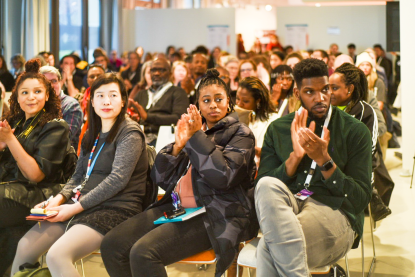
Find up-to-date reviews on all 17 EFM Horizon events and interview series with key players of the film and media industries on cutting-edge market trends and innovations. Journalist and filmmaker Andrew Houchens joins all EFM Horizon events and meets entrepreneurs, producers, distribution and sales agents sharing their opinions on the latest industry developments.
Contact
EFM Horizon
Berliner Freiheit, 10785 Berlin
Day 1 | Friday 21 FEB
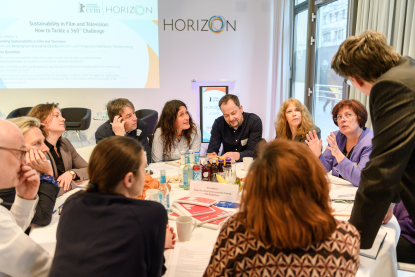
Sustainability & Visibility: Reduce, Reuse, Recycle, Repeat
Horizon 2020 kicked off with a workshop on sustainability, a topic that has many arms and legs in the market this year, and which certainly has ears burning across all sectors of the production and festival landscape today. Invited guests addressed issues facing distribution and festivals with regard to sustainability, and brainstormed incentives and ways that funders and funding bodies can support more sustainable models.
With EFM’s newly-minted Sustainability Manifesto in place since January, the market has made widely transparent its goals and current actions toward sustainability, something which producer and green consultant Korina Gutsche of Bluechild Film pointed to as a major achievement. But Gutsche noted this is merely a baby step in the necessary direction that EFM will hopefully move toward in future years. Leading a brainstorm session on festival sustainability, her group concluded that beyond visibility, festivals must also consider resources, merchandising, print, accommodation, and mobility when building-out a sustainable event, but it can and should also be enjoyable. For example, festivals could provide bikes for guests to reduce their carbon footprint. But self-responsibility and social consciousness come first: “Sustainability is also about health and has a social aspect, so for one to be sustainable they must first focus on self-care.” Self-care and well-being is another major topic to be explored at Horizon in the coming days.
Find this and other reports in our Industry Reports section.
Download PDF
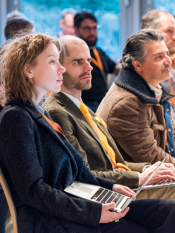
Nostradamus and the Future of A/V: Hope or Dread?
“Producers are pragmatic, we need to evolve or we are dead.” This was the proclamation of European Producers’ Club (EPC) Managing Director Alexandra Lebret following the presentation of Göteborg Film Festival’s annual Nostradamus Report, looking to the future of the audiovisual industry. Lebret was highlighting EPC members’ recent partnership with an AI tech company to help address production needs, something she said producers learned from their cohorts in the streaming world.
Lebret, who contributed to this year’s Nostradamus Report, was joined in a panel by Sofa Digital CEO Fabio Lima and Curzon Films CEO Philip Knatchbull as they debated the space of alternative releasing. Knatchbull predicted that streaming giants will end up owning major theaters (which in actuality has already happened, with Netflix’s recent purchase of New York City’s Paris Theater, the last single-screen movie palace in Manhattan). Knatchbull said that Curzon has found success with “giving audiences exactly what they want instead of what you think they want”, using day-and-date releasing as a prime example. Curzon balances this with an increase in building micro-cinemas in the UK, something they’ve been doing more and more over the last few years. “Whatever the customer wants, they should be allowed to have,” he added. Presentation of the Nostradamus Report ended on a particularly positive note, citing the global commercial success of 2019’s PARASITE, deemed “a huge opportunity… for a post-colonial critique to become a huge success in the U.S. is fantastic”, and a beacon of hope in a constantly unpredictable and changing landscape.
Find this and other reports in our Industry Reports section.
Democratizing the Future
The first of three Industry Debates this year imagined the future of storytelling, which Imagine Impact principal Tyler Mitchell argued is all about democratization and equal access for all to the industry. An app for writers - both amateur and professional - to upload their work and have it reviewed by professionals and disseminated to the industry at large, the innovative platform is co-founded by Brian Grazer and Ron Howard. Beyond seeing diversity and inclusion as merely a trend, Mitchell and his partners believe they are in fact crucial to our industry’s future. With viewer consumption exploding and approximately 1 billion estimated worldwide streaming subscribers this year, content demand will only increase. Mitchell views this as a great opportunity but furthermore, it urges the necessity to find more writers and creators.
With old world systems and gatekeepers breaking down, Imagine Impact is among various new tools to find and generate new stories. And they’re seeing success, with dozens of projects submitted in year one already acquired or setup at places like Netflix, Amazon, Lionsgate, and Warner Brothers. With a focus on discovering new writers - the “nucleus of the industry”, as Mitchell put it - democratizing and empowering new and underrepresented voices seems to be the new normal, not just a passing inclination.
This Industry Debate is available for streaming online here.
Day 2 | Saturday 22 FEB
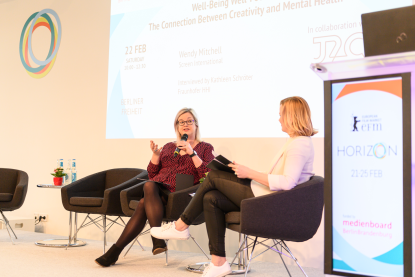
Battling Mental Health in the Biz: Is It Just Me...?
With a recent study showing that 87% of individuals working in film, TV, and cinemas in the UK had experienced a mental health problem in their lives compared with 65% of the general population, it’s clear to see that something is out of whack.
Why do people in the creative industries have significantly lower levels of subjective well-being than national averages? While this study focused on the UK alone, it’s not difficult to imagine this being the case the world over, with hectic production schedules, stressful delivery deadlines, and long hours in the industry no matter where you’re working, and work/life balance always in question. Is there a connection between creativity and vulnerability to mental health issues?
EFM’s first foray into the topic pondered this question at Saturday morning’s session, with mental health professionals encouraging open dialogue, self-care, and community-building to help battle our psychological demons. Screen International’s Wendy Mitchell pointed to positive changes she is starting to see in the industry, like a free 24-hour health hotline provided by Britain’s Film and TV Charity for creatives to call at any time they are in need. Disappointingly, she noted that organizational counterparts in other countries - like the big guilds in the US - offer nothing like this kind of hotline to their members, and most don't offer concrete mental health programmes. Hopefully this will change soon, but in the meantime the session brainstormed ways we can help ourselves relax and calm creative nerves, like practicing breath work, meditation, journaling, and sensory deprivation. Guests were blindfolded and given noise-canceling headphones at the session’s close to demonstrate how sometimes “tuning out” can be the best way to tune in to our health and creative well-being.
By putting mental health in focus and out onto the table, EFM hopes to join a growing movement of mental health awareness, practicing compassion and care for its ever-expanding community.

Embrace (Tech) Change
“With streaming, we know now less than we did 10 years ago. The amount of stuff I don’t know is always increasing, I’m actually pointless on this panel.” Don’t be so hard on yourself, Phil Hunt! We’re all playing catch up, too.
While Phil and his fellow panelists at Saturday afternoon’s session are certainly no dummies - all veterans in the areas of production, finance, and tech - it is true that it’s increasingly hard to understand the film and TV landscape in the ever-changing streaming era. But there are ways we can future-proof business models as we look to what’s next. FilmChain CEO Irina Albita outlined three basic principles one should be aware of: 1) Change the “mystery” mindset on technology, make it a core of your business strategy and not just an operational cost, 2) Evaluate what data you need to operate your business or production and utilize existing resources, such as script development tools driven by machine learning, 3) Use transparency to your advantage, because sharing information is the future.
While we still don’t know so much and can never predict future changes, panelists encouraged embracing technology over all, with examples like improved workflows and heightened security now making production safer and easier.
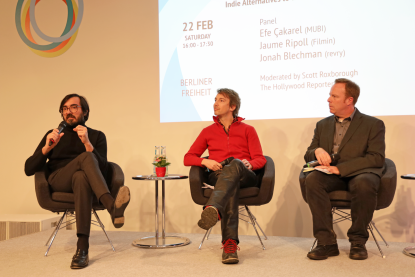
Streaming Away: Something for Everybody
The debate on streaming continued Saturday at the second Industry Debate, featuring a bevy of speakers representing various streamers, from the “benchmark” Netflix to niche platforms like revry (LGBTQ+ content), Filmin (Spanish and Portugese language), and MUBI (highly curated arthouse and classic cinema).
Experts from the streaming music world also helped brainstorm ways the film industry can learn from them, as music is arguably the “original” streaming content, with a longer trajectory than film. With recommendation algorithms highly popular across all platforms but with new and emerging filmmakers relatively unknown - and therefore at a disadvantage to quantify in an algorithm - why not create more platforms for emerging talent to share work, build audiences, and allow audiences to openly communicate with and support them? This is exactly what Soundcloud does for musicians, for example.
The streaming world will only become increasingly fragmented with a number of new and soon-to-come studio-backed platforms entering the arena (Disney, HBO, NBC, etc.), so audience and market differentiation will be crucial for niche platforms to survive and thrive. But with ever-increasing global streaming viewership, experts also see opportunity for production: the need for more content and local production driven by consumer need is creating more work for filmmakers and content creators.
This Industry Debate is available for streaming online here.
Day 3 | Sunday 23 FEB
Keep Them Coming Back For More
“If you’re open and flexible, the world is your oyster.”
Across all industries, it was agreed at Sunday’s “Vying for Consumer Attention” session that being flexible is a secret weapon that all content creators and distributors should share, no matter if they’re making games, series, music, or other. With constant changes in the streaming and digital distribution landscape and the ever-expanding proliferation of content available, all industries are arching for retention, hoping that the consumer will come back for more (and keep coming, always).
Panelists agreed that data has become a major tool to help them understand their respective audiences, and that no matter if you’re making a game, a song, or a film, data-driven research should be key in helping you develop your product. “But don’t be afraid of data as the killer of creativity, it’s only one tool in your arsenal,” encouraged electronic music industry expert Melissa Taylor. “Creativity is still inherently human and machine-learning is driven by humans, so creativity will never die.”

Call to Consciousness
“If you’re conscious, you’re responsible”
With alarming recent studies out of the UK showing that one hour of TV production creates the equivalent of 13.5 tonnes of CO2 emissions - enough energy to keep three homes running for a year - it’s clear our industry needs a wakeup call. This was the focus of Saturday’s continued conversation around sustainability in the creative industries, where the need for climate consciousness and self-responsibility was highlighted as the first step in an important process toward helping save our planet, even if bit by bit.
Among issues debated were how to make festivals greener and the awareness needed around the often invisible environmental impact of streaming distribution platforms, which generated over 100 million tons of CO2 emissions in 2018 alone. But consciousness comes first; truly understanding the impact of our own actions. This is what led EFM Director Matthijs Wouter Knol to develop EFM’s 2020 Sustainability Manifesto, after being made aware by his staff how the physical waste created from each market troubled many. This made Knol begin thinking more practically about what the market can do to reduce waste, like sharing with other organizations resources that - physical and other - the market doesn’t use the other 11 months of the year when it’s not Berlinale. “If we don’t care, we cut ourselves off from the thing that makes us human, human connection,” added Jacob Sylvester Bilabel, founder of the Green Music Initiative.
It was also strongly suggested and applauded that if festivals and organizations aren’t adhering to practical and common regulations around CO2 emissions, they simply shouldn’t receive public funding.
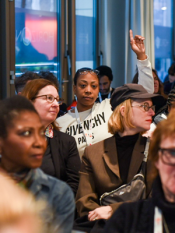
Won’t Back Down: 5050x2020
“Failure is not an option, this movement will not go back into the box.”
Swedish Film Institute (SFI) CEO Anna Serner, a fierce advocate for gender parity in the creative industries, on Sunday outlined how her organization has tackled and championed this issue head-on, with no plans of turning back.
By using and sharing data, encouraging education, building alliances, and by being unwaveringly vocal, Serner and SFI’s 50/50 by 2020 initiative - launched in 2016 at Cannes - has helped lead the way for a growing number of global advocates for gender parity. Not only looking at gender but also focusing on intersectionality, SFI has made core to its mission increasing industry access for all, and giving more visibility and support to filmmakers of color and the LQBTQ community.
Sweden seems to be at the forefront of this movement, with Göteborg Film Festival as well having committed to 50/50 gender parity for its films in 2020, something which artistic director Jonas Holmberg said was actually not so hard to do once they dove into the large talent pool of submissions. But Serner noted that quick fixes won’t work in the long run; true change will take generations: “We also have to track and follow the money, because money is the power,” she said, highlighting the importance of decision makers and those greenlighting films to also reckon with diversity in their ranks, looking at the pipeline at every single level and not just at the top.
Breaking the Film Marketing Waves
While Saturday’s Horizon session focused on future-proofing strategies for the streaming business, on Sunday the final Industry Debate shone the spotlight on future-proofing for film marketing. “As a filmmaker, don’t be too precious with your marketing. Trust your distributor to handle it and do their job, you’ve already done yours,” suggested Karina Gechtman of UK sales outfit Altitude Films. Panelists also agreed that social media plays a more and more crucial role in film marketing, sometimes now totally replacing the need for EPKs, traditionally viewed as a must for a successful film marketing campaign.
Social media is also a more democratic and budget-friendly tool for marketing, sometimes requiring zero spend for massive outreach potential. Though filmmakers must be savvy and really understand the technology with social media, “it’s not just something that you should leave an intern to do,” said Gechtman. With social media, audience outreach can also be evaluated immediately, and the strategy shifted if something doesn't seem to be working. Filmmakers should also think about their audience and how to reach them immediately when beginning a project, not just when in post and looking to the premiere. Above all, “movies still need to be special and unique to find success” or the marketing doesn't matter at, noted Cinetic Media’s Ryan Werner.
This Industry Debate is available for streaming online here.
Day 4 | Monday 24 FEB
Intersective Innovation: EFM Startups 2020
The class of 2020 EFM Startup companies are ready and waiting to meet you at MGBs’ ground floor popup offices, but at Monday morning’s Horizon session you could hear them pitch their innovative business concepts live and up close. Some newly minted and others in year two or three of their models, all share a common disruptive spirit. Looking to break through the audiovisual landscape with new tools and process-enhancing devices, like the rest of the market most are also hoping to find investors at EFM.
Some, such as London-based Smash, have the fortune of incredible experience in the industry already, with Bankside Films’ co-founder Hillary Davis among advisors to the platform re-imagining the production process. Among Smash’s various functions is a sales projection tool which Davis helped formulate, empowering producers to make more confident decisions as they set out to develop and finance new projects. Smash also claims to help open the playing field for filmmakers by streamlining and automating production processes, giving it a user-friendly democratizing quality that will hopefully be embraced with open arms by EFM industry and beyond.
For more information on participants of all previous EFM Startups editions, please see the EFM Startups Alumni.
Immersive VR Enhancing Production
Monday’s fourth annual VR NOW Summit at Horizon kicked off with an inspiring talk from veteran DP Caleb Deschanel, who summarized his innovative work making Disney's THE LION KING with VR technology. The filmmakers created a virtual African world for the film and digitally “location scouted” where and how they were going to make the film using VR animated storyboards. “There were constant challenges but every day was an exciting new discovery in the creative process,” he said.
Deschanel suggested that another benefit to using VR for production is being able to oversee the creative direction of VFX as they’re being made "on set", as opposed to having to send the film off to post with total unpredictability or much of a role in how the VFX will result. Following Deschanel’s keynote, a number of talks and panels addressed topics from VR’s changing role in the A/V landscape to new trends and models in the space, and the bold and challenging “Project Witness: An Immersive Experience Inside Child Incarceration” by Black Dot Films VR was featured for its world premiere.
#thefutureisfemale: Women in (Film) Tech
“The industry is changing to a fairer and more transparent model where everyone should have access, and everyone wants this,” claimed usheru CEO and former Google executive Catherine Downes at Monday evening’s female-driven FilmTech Meetup. In year five of EFM Startups, alumni participants are growing up and shining bright, with Downes and two fellow Startup companies returning to EFM this year to share knowledge, experience, and their successes. Joined by Scriptbook’s Nadira Azermai and FilmChain’s Maria Tanjala, the feminist power trio agreed that their companies are fully aligned in each's mission of democratization and increased transparency in the industry, bolstering the sentiment at Sunday’s 5050x2020 event that there’s no going back to the old-world ways of the traditional film business.
Each company’s disruptive and risk-taking model is seeing growth, for example with Scriptbook’s AI script analysis software now under contract with three major (and confidential) studios. But Azermai said the major studios are still completely risk-averse to change, so she’s had to push hard with her model. Fortunately, the pushing seems to be paying off.
Day 5 | Tuesday 25 FEB
“Cheerful Pessimism” & Creativity Today
“It’s a mistake to specialize as a creative intellectual, filmmakers also need to do other things, have a voice”, proposed author, filmmaker, and self-described provocateur Andrew Keen in a session exploring how creatives can help fix the troubling crisis of democracy in the world today, arguably assisted by new digital technologies.
“It’s not enough just to be one thing… artists must also aggressively pursue partnerships and learn how to listen.” Strongly suggesting it’s a mistake to “fetishize” the past - people he describes as “Yesterdays” - Keen said we need to innovate democracy but also not get lost to blind pessimism or blind optimism as we look to the future, with creative individual agency central to this. Describing himself as a “cheerful pessimist”, instead of feeling dread about our current situation Keen sees the 21st century as a cultural renaissance: “The way to fix the future is to embrace humanism.”
AI is Not the Enemy
“Envision a world where more creators can better collaborate to tell stories,” suggested Roderick Hodgson at Tuesday’s session looking at the current state of AI and the creative industries. Hodgson’s startup Simon Says helps facilitate a more streamlined production process with AI technologies, employing AI to automate video transcription and translation. This is saving content creators money and hours of time so that they can focus on the more creative aspects of production, but also importantly helping democratise the process overall.
AI is seeing a revolutionary moment in the industry, but many have remained skeptical of its capabilities and potentially detrimental effect on creativity. Sundance Institute’s Jess Fuselier was encouraging, noting that AI will never replace the creative process or be able to write a successful script, rather it should be a helpful tool for storytellers to expand their creative process.
Digital Distribution: New Models, New Challenges
Digital distribution stakeholders are imagining new ways to reach (and retain) audiences, amongst debating challenges like how to convert local, niche audiences into global ones.
At Tuesday’s Challenging Distribution working session, streamers and distributors alike shared knowledge and successes in their ever-changing landscape. Deepak Jayaram of myNK, a blockchain-powered VOD platform in India, mentioned how his company is encouraging conversation between its subscribers by providing chatroom capabilities, allowing viewers to feel more like cinephiles and creators themselves through sharing user-created content like film mashup videos and memes. This has greatly boosted customer retention but also helped myNK define different niches in their large market, certainly a unique challenge for a startup in a country of over 1 billion. Above all, digital distributors must be willing to constantly adapt, with market changes and technological developments in no sight of slowing down.
Find this and other reports in our Industry Reports section.
Download PDF
Global Streaming & the EU Now
“Viewers today want addictive storytelling that they can binge and talk about”
So said X Filme’s Michael Polle, producer of the German series BABYLON BERLIN. At Tuesday's interactive workshop, Polle suggested that the series’ global success is due to its focus on characters, situations, and conflict instead of specific themes and topics.
The producers originally thought of shooting in English to reach wider audiences, but directors refused. Fortunately they found that audiences were willing to watch no matter the language, with the cliff-hanging, binge-worthy quality of the show appealing to all. So is local the new global in streaming? The answer seems to be yes, with Netflix’s Wolf Osthaus concurring that audiences want to see content that is directly relevant to them, moving the company from its original model of US-based, English-language content only to a model with productions now in dozens of countries and languages, in the EU and beyond. This has significantly boosted Netflix’s production output, but also increased the platform's global viewership.
